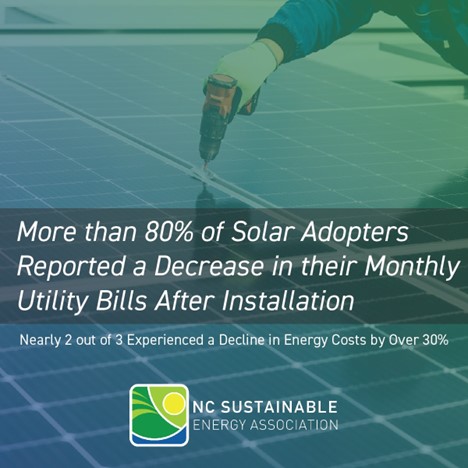More Than 80% of North Carolina Clean Energy Adopters Experience Significant Reductions in Energy Bills
With information on clean energy ownership coming from such a broad range of sources, it can be difficult to determine the actual economic benefits of purchasing a solar system, an electric vehicle (EV), or another clean energy technology for your home. However, there is increasing evidence indicating the value of clean energy, including data from a recent survey conducted by the North Carolina Sustainable Energy Association (NCSEA) demonstrating that consumers are clearly motivated to invest in these technologies. In 2021 alone, 7,195 residential solar systems were installed in North Carolina, amounting to 56.3MW of installed energy capacity.
Recently released by NCSEA, the Perception, Experience, And Adoption Of Residential Clean Energy in NC Report analyzes over 4,000 survey responses to shed light on the motivations and experiences of clean energy adopters across the state. Leveraging NCSEA’s internal data on renewable energy customers across the state, the survey team contacted North Carolina residents who have installed solar, energy storage, EVs, solar thermal, and geothermal ground source heat pumps. By gathering survey data directly from clean energy consumers, this report provides a unique, first-hand glimpse into clean energy ownership and seeks to inform and empower all North Carolinians to take part in the clean energy transition.
Unsurprisingly, the most popular clean energy technology was solar photovoltaic (PV) systems, with over 70% of respondents having adopted solar. Notably, more than 80% of solar adopters reported a decrease in their monthly utility bills post-installation, and almost two-thirds of this group experienced a decline in energy costs of over 30%. These definitive results highlight the significant return on investment available for those considering installing solar on their homes.

Furthermore, over 66% of respondents anticipate recovery of their investment within 15 years of installation. With the passage of the Inflation Reduction Act (IRA), there will be more financial incentives available than ever to reduce the upfront cost of solar systems, which aligns directly with survey responses designating federal tax credits, rebates, and incentives as the most important financing option for adopters. As a way to maximize utility bill reductions from installing solar, many respondents also proceeded with energy efficiency upgrades in their homes. The most popular energy efficiency measures included lighting upgrades, insulation, home automation, and window upgrades.
In order to drive more North Carolinians to adopt clean energy technologies, it is vital to gain a better understanding of customer motivation and satisfaction. When examining why people are adopting solar, North Carolina clean energy customers are primarily motivated by the cost of their electric bills, environmental concerns, and financial benefits. Although there is some overlap between motivations for purchasing different clean energy technologies, additional factors like the cost of gas play a critical role in considering purchasing or leasing an EV. In fact, 75% of respondents with EVs noted the cost of gas as an important factor in their decision-making process.
In terms of customer satisfaction, solar adopters are most satisfied with system performance, utility bill savings, and access to federal tax credits, but identified higher levels of dissatisfaction with access to state tax credits, rebate or incentive programs, and installer support after installation. When examining customer satisfaction for EVs, a whopping 97% of respondents with EVs were satisfied with the quality and performance of their vehicles. This group also reported high levels of satisfaction with car maintenance, dealer experience, and driving long distance, while rebate or incentive programs stood out from the pack with 36% unsatisfied.
In order to better understand North Carolina’s population of clean energy adopters and identify barriers to low-income communities and communities of color investing in clean energy, NCSEA included a demographics section in the latest iteration of the survey. Of note, clean energy adopter household incomes are higher than the median North Carolina household income. In fact, 33% of respondents reported household incomes of more than $160,000, while only 26% of clean energy adopters made less than $80,000. While this data illustrates a stark disparity in clean energy adoption between low-income and high-income households, there has also been progress in recent years. Since 2015, households earning incomes between $40,001-$80,000 nearly doubled their percentage rate of solar adoption, while the adoption rate percentage for households earning more than $160,000 declined by almost half. On a related note, North Carolina’s most economically distressed counties more than doubled their share of solar adoption. However, in 2022, North Carolina’s 20 most prosperous counties still accounted for more than two-thirds (69.59%) of residential solar adoption. In a state where race and income are highly correlated, this finding demonstrates one instance of energy inequity facing communities of color. Overall, these demographic trends show recent headway in expanding access to clean energy while also underscoring the need to continue advocating for equitable policies that enable all North Carolinians to choose clean, affordable energy options.
As a whole, this report provides valuable insights into consumer attitudes and issues of clean energy accessibility. It is evident from survey responses that North Carolina is experiencing a residential clean energy boom, making it crucial to continue exploring opportunities to open the marketplace to all North Carolinians. To find out more about the survey implementation process and investigate additional survey data on North Carolina’s clean energy adopters, take a look at the full Perception, Experience, And Adoption Of Residential Clean Energy in NC Report located on the Publications page of our website.


Awareness. Advocacy. Access. You nailed this on the head succinctly and provided valuable data analysis that our communities need in order to understand the impact of clean energy (awareness), use that knowledge for good (advocacy), and take full advantage of this historic opportunity (access). Let’s host a roundtable! #codeorange